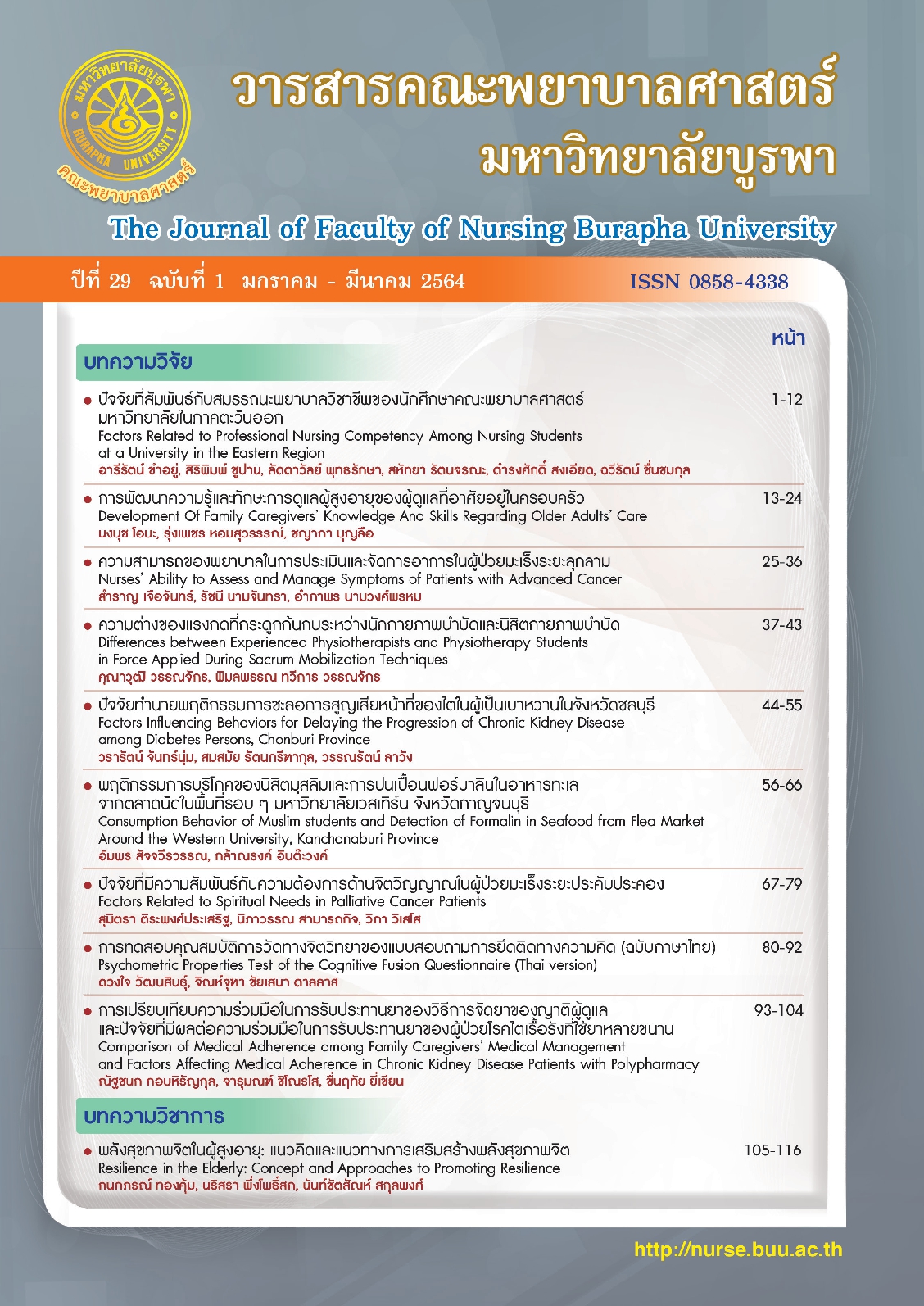การเปรียบเทียบความร่วมมือในการรับประทานยาของวิธีการจัดยาของญาติผู้ดูแลและปัจจัยที่มีผลต่อความร่วมมือในการรับประทานยา ของผู้ป่วยโรคไตเรื้อรังที่ใช้ยาหลายขนาน
คำสำคัญ:
โรคไตเรื้อรัง, การใช้ยาหลายขนาน, ญาติผู้ดูแล, วิธีการจัดยา, ความร่วมมือในการรับประทานยาบทคัดย่อ
การวิจัยนี้มีวัตถุประสงค์เพื่อเปรียบเทียบความร่วมมือในการรับประทานยาของวิธีการจัดยาของญาติผู้ดูแลและ
ปัจจัยที่มีผลต่อความร่วมมือในการรับประทานยาของผู้ป่วยโรคไตเรื้อรังที่ใช้ยาหลายขนาน โดยทำการศึกษาในญาติผู้ดูแล
และผู้ป่วยโรคไตเรื้อรังที่ญาติพามารักษาที่แผนกผู้ป่วยนอกโรงพยาบาลสมเด็จพระบรมราชเทวี ณ ศรีราชา จำนวน
อย่างละ 221 คน เก็บข้อมูลระหว่างวันที่ 1 เมษายน ถึง 31 กรกฎาคม พ.ศ. 2563 โดยการใช้แบบสอบถามญาติผู้ดูแล
ถึงวิธีการจัดยา และแบบประเมินความร่วมมือในการรับประทานยา วิเคราะห์ข้อมูลด้วยสถิติเชิงพรรณนา สถิติไคสแคว์
และวิเคราะห์ปัจจัยด้วยสถิติถดถอยแบบโลจิสติก
ผลการวิจัยพบว่าวิธีการช่วยอ่านหรือแปลข้อมูลวิธีการรับประทานยา ทำให้ผู้ป่วยโรคไตเรื้อรังที่ใช้ยาหลายขนาน
มีสัดส่วนระดับความร่วมมือในการรับประทานยาระดับสูงมากที่สุด รองลงมา ได้แก่ วิธีการสอบถามถึงการรับประทานยา
และการดูแลควบคุมขณะผู้ป่วยรับประทานยา ส่วนปัจจัยที่มีผลทำให้ผู้ป่วยมีความร่วมมือในการรับประทานยาระดับ
ปานกลางและสูง ได้แก่ ปัจจัยของญาติผู้ดูแลที่มีอายุ 18 ถึง 59 ปีผลการวิจัยเสนอแนะว่า แพทย์และบุคลากรการแพทย์
ควรแนะนำให้มีการจัดหาญาติผู้ดูแลที่มีอายุ 18 ถึง 59 ปีมาช่วยดูแล เพื่อทำให้ความร่วมมือในการรับประทานยาของ
ผู้ป่วยโรคไตเรื้อรังเพิ่มมากขึ้น
เอกสารอ้างอิง
caregiver among cardiac patients. Annals of Behavioral Medicine, 46(2), 237-242.
Ahlawat, R., Tiwari, P., & D'Cruz, S. (2016). Prevalence and predictors of medication non-
adherence in patients of chronic kidney disease: evidence from a cross sectional
study. J Pharma Care Health Sys, 3(152), 2376-0419
Busapongnich, S., & Dandecha, P. (2006). Improper drugs use behavior of chronic kidney
disease patients. Songklanagaring Medical Journal, 24(4), 281-287. [in Thai]
Centers for Disease Control and Prevention. (2019). Chronic kidney disease in the United
States, 2019. From: https://www.cdc.gov/kidneydisease/pdf/2019_National-Chronic-Kidney-Disease-Fact-Sheet.pdf
Foebel, A.D., Hirdes, J.P., & Heckman, G.A. (2012). Caregiver status affects medication
adherence among older home care clients with heart failure. Aging Clinical and
Experimental Research, 24(6), 718-721.
Ingkamanee, N., Kusuma Na Ayuthya, S., Puwarawuttipanit, W., & Peerapatdit, W. (2011).
Effectiveness of promoting a problem-solving ability program on medication adherence in patients with type 2 diabetic. Journal of Nursing Science, 29(2), 56-64. [in Thai]
Magacho, E., Ribeiro, L., Chaoubah, A., & Bastos, M. (2011). Adherence to drug therapy in
kidney disease. Brazilian Journal of Medical And Biological Research, 44(3), 258-262.
National News Bureau of Thailand. (2018). Department of medical services found 8 million
people with chronic kidney disease, advising people to take care of their kidney. From https://thainews.prd.go.th/th/news/print_news/TNSOC6103290010057 [in Thai]
Roter, D., Narayanan, S., Smith, K., Bullman, R., Rausch, P., Wolff, J., & Alexander, G. (2018).
Family caregivers’ facilitation of daily adult prescription medication use. Patient Education and Counseling, 101(5), 908-916.
The Nephrology Society of Thailand. (2015). Clinical practice recommendation for the
evaluation and management of chronic kidney disease in adults 2015. Bangkok: The Nephrology Society of Thailand. [in Thai]
Siva, K.T., Sreedevi, A., Prasad M.V.H., & Jikki, P.N. (2019). Assessment of knowledge
and adherence to therapy among chronic kidney disease patients attending
nephrology department of tertiary care hospital, Kurnool city, Andhra
Pradesh. International Journal of Medical Science and Public Health, 8(3), 223-229.





